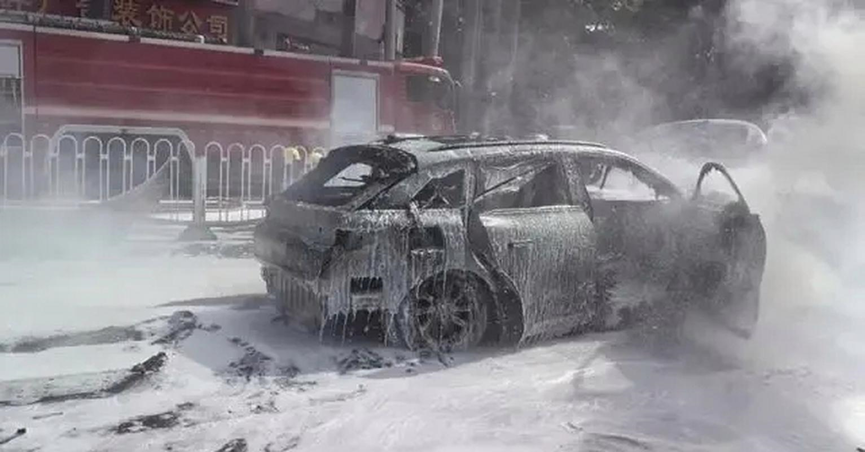Many parking lots say "no" to new energy vehicles, and consumers should not be blamed for spontaneous combustion
![]() 09/26 2024
09/26 2024
![]() 392
392
Recently, there have been frequent reports of hotels and supermarkets in Hangzhou, Ningbo, and other places saying "no" to new energy vehicles in their underground parking lots. In contrast, gasoline-powered vehicles are allowed to enter freely, leading to widespread indignation among owners of new energy vehicles.
As new energy vehicles are rapidly gaining popularity, with a penetration rate exceeding 50%, more and more people are choosing electric vehicles due to rising environmental awareness and cost-effectiveness. However, the sudden ban on new energy vehicles in parking lots, often justified by safety concerns and the risk of spontaneous combustion, belies a more complicated story behind the scenes.
Spontaneous combustion of new energy vehicles triggers bans
According to parking lot managers who have imposed bans, their decision is based on safety considerations and not discrimination against new energy vehicle owners. However, recent years have seen several incidents of spontaneous combustion in new energy vehicles globally, some of which have resulted in severe consequences. Fearing potential fire hazards, many parking lot managers have banned new energy vehicles in the name of safety.

Fire experts point out that fires in new energy vehicles can be highly flammable and explosive, making them difficult to control and extinguish. This is due to the characteristics of the power batteries used in these vehicles. Cao Guangping, an independent researcher in the new energy vehicle industry and partner at Chef Consulting, explains that lithium dendrites, which resemble small tree branches, form during battery charging. If these dendrites accidentally puncture the battery separator, the electrolyte can flow between the positive and negative electrodes, causing a short circuit that can lead to a violent fire with electrochemical properties.
Furthermore, fighting fires in new energy vehicles is especially challenging. The batteries decompose oxygen during combustion, making conventional oxygen-deprivation firefighting methods ineffective. Fire experts warn that the risk of re-ignition due to short circuits in the wiring system is high, and water can exacerbate this risk by conducting electricity. Surveys show that vehicles parked for several days are prone to re-ignition. Underground garages pose additional challenges for firefighting due to limited access and the risk of chain reactions.

While there may be legitimate reasons for parking lot managers to ban new energy vehicles, the blanket ban approach is unfair. Using spontaneous combustion as an excuse to restrict the rights of new energy vehicle owners and shift responsibility for fire safety management is unacceptable and has sparked resistance from these owners.
Bans are excessive and potentially illegal
Misconceptions about the higher spontaneous combustion rate of new energy vehicles have been debunked by official sources. In 2017, the Ministry of Industry and Information Technology commissioned Beijing Institute of Technology to establish and operate the National Monitoring and Management Platform for New Energy Vehicles, which now covers about 90% of new energy vehicles nationwide. These vehicles transmit operational data to the national platform every 30 seconds, providing valuable insights. Statistics show that the incidence of fires in new energy vehicles has been declining year after year. In 2019, the fire incident rate was one in ten thousand, dropping to 0.5 per ten thousand in 2020, 0.24 per ten thousand in 2021, and further to 0.22 per ten thousand in 2022. In comparison, the fire incident rate for gasoline-powered vehicles is between 1 and 2 per ten thousand. This clearly demonstrates that new energy vehicles actually have a lower spontaneous combustion rate than gasoline-powered vehicles. However, due to the high news value of spontaneous combustion incidents involving new energy vehicles, they tend to receive more media coverage, leading to misconceptions among consumers.

From a legal perspective, China's Civil Code has clear provisions regarding the ownership of parking spaces and garages. For underground garages in commercial buildings such as hotels, if there is a single owner, they have the right to own and operate the garage and can set usage rules, but these rules must be fair and reasonable. As long as consumers use new energy vehicles legally and pose no real safety hazards when entering or exiting underground garages, they have the right to do so. Hotels and other business entities should equip garages with fire-fighting equipment and take safety measures to prevent accidents such as spontaneous combustion in new energy vehicles while ensuring that consumers can enjoy parking services without discrimination.
For residential underground garages, if homeowners have purchased or long-term leased parking spaces, property management companies, as managers of these spaces, have no right to restrict the reasonable parking of new energy vehicles and should even assist in installing charging piles. If property management companies forcibly prevent this, homeowners can protect their legal rights by lodging complaints or filing lawsuits.

To dispel public misconceptions about new energy vehicles, regulatory agencies, industry departments, and associations in China should promptly clarify the facts and provide comprehensive information to the public on the safety of electric vehicles, as well as the necessary safety facilities and precautions for parking and charging in underground garages. If there is no significant difference in safety between new energy vehicles and gasoline-powered vehicles, owners of new energy vehicles should enjoy equal parking rights without discrimination. These measures will promote the popularization and development of new energy vehicles while safeguarding the legitimate rights and interests of consumers.








